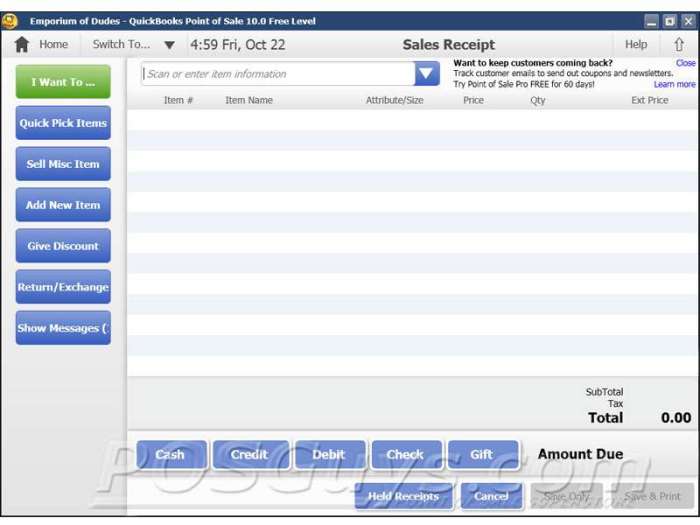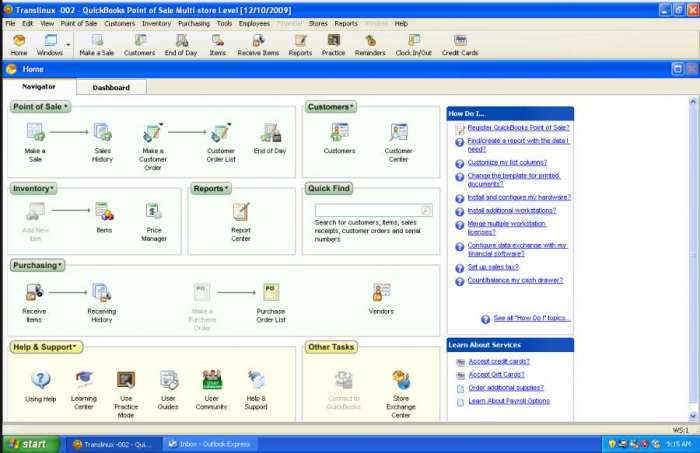Quickbooks point of sale software – QuickBooks Point of Sale (POS) software is a powerful tool for businesses of all sizes to manage their daily transactions and operations efficiently. This comprehensive guide delves into the intricacies of QuickBooks POS, exploring its features, benefits, and considerations for businesses looking to streamline their sales processes.
Understanding QuickBooks Point of Sale
QuickBooks POS is a robust software solution designed to manage various aspects of retail and restaurant operations, from taking orders and processing payments to managing inventory and reporting sales data. It’s a popular choice for small and medium-sized businesses (SMBs) seeking a centralized system to handle all aspects of their sales transactions. This software integrates seamlessly with other QuickBooks products, such as QuickBooks accounting software, offering a complete financial management ecosystem.

Source: johanneskr.is
Key Features of QuickBooks POS
- Sales Order Management: QuickBooks POS allows for efficient handling of customer orders, from order placement to fulfillment. This includes features like order tracking, order modification, and order cancellation.
- Inventory Management: The software provides a comprehensive inventory tracking system, helping businesses manage stock levels, track product movements, and predict potential shortages.
- Payment Processing: QuickBooks POS supports various payment methods, including credit cards, debit cards, and cash, ensuring smooth and secure transactions.
- Reporting and Analytics: Detailed reports and analytics tools provide insights into sales trends, customer behavior, and inventory performance. This allows businesses to make data-driven decisions for growth and improvement.
- Customer Relationship Management (CRM): Some QuickBooks POS versions integrate CRM features, enabling businesses to manage customer information, track interactions, and build stronger relationships.
- Multi-Location Support: Ideal for businesses with multiple locations, QuickBooks POS allows for centralized management of operations across different sites.
Benefits of Using QuickBooks POS: Quickbooks Point Of Sale Software
Implementing QuickBooks POS can yield significant benefits for businesses, including improved efficiency, enhanced accuracy, and better financial management. The integrated nature of the software with other QuickBooks products is a key advantage, leading to a streamlined workflow.
Improved Efficiency and Productivity
- Streamlined Sales Processes: POS systems automate sales transactions, reducing manual data entry and freeing up staff to focus on customer service.
- Reduced Errors: Automation minimizes human errors associated with manual data entry, leading to greater accuracy in sales records.
- Enhanced Customer Experience: QuickBooks POS can facilitate faster service times and more personalized customer interactions.
Enhanced Financial Management
- Real-time Financial Reporting: QuickBooks POS offers real-time insights into sales figures, inventory levels, and other financial data, empowering better financial decision-making.
- Improved Accounting Accuracy: Data from POS transactions are automatically synced with QuickBooks accounting software, reducing manual reconciliation efforts.
- Better Inventory Control: QuickBooks POS allows for precise inventory tracking, helping businesses avoid stockouts and overstocking.
Choosing the Right QuickBooks POS System
The best QuickBooks POS system depends on the specific needs of the business. Factors to consider include business size, industry, number of locations, and required features.
Key Considerations, Quickbooks point of sale software
- Scalability: Ensure the chosen system can accommodate future growth and expansion.
- Integration with Existing Systems: Check for seamless integration with existing accounting and CRM systems.
- Customer Support: Assess the quality and availability of customer support provided by the vendor.
- Pricing and Implementation Costs: Compare different pricing plans and implementation costs to determine the most cost-effective solution.
FAQ
Q: What are the different QuickBooks POS plans available?
- A: QuickBooks POS offers various plans to cater to different business needs and budgets. Details can be found on the official QuickBooks website.
Q: How much does QuickBooks POS cost?
- A: Pricing varies based on the plan chosen and features required. Contact QuickBooks directly for specific pricing details.
Q: Is QuickBooks POS suitable for restaurants?
- A: Yes, QuickBooks POS is often used by restaurants due to its features for managing food orders, inventory, and payment processing.
Conclusion
QuickBooks POS offers a comprehensive solution for businesses looking to streamline their sales processes, enhance financial management, and improve overall efficiency. By understanding the key features, benefits, and considerations, businesses can select the optimal POS system to drive growth and success.
Source: Intuit QuickBooks POS Website
Disclaimer: This article is for informational purposes only and does not constitute financial or professional advice. Always consult with relevant experts for specific guidance on your business needs.
Ready to enhance your business operations? Contact QuickBooks for a demonstration and pricing information.

Source: johanneskr.is
Query Resolution
What are the system requirements for QuickBooks Point of Sale?
Specific system requirements vary depending on the QuickBooks Point of Sale version. Consult the official QuickBooks website for the most up-to-date and precise specifications.
How does QuickBooks Point of Sale handle different payment methods?
QuickBooks Point of Sale supports a wide range of payment methods, including credit cards, debit cards, and cash. It provides secure processing and detailed transaction records for each payment type.
Can QuickBooks Point of Sale integrate with other POS systems?
Direct integration with other POS systems is not typically possible. However, QuickBooks Point of Sale often allows for data import and export to facilitate some level of compatibility with existing systems, though this may involve additional configuration or third-party tools.